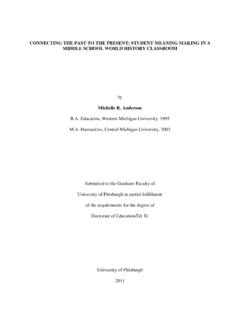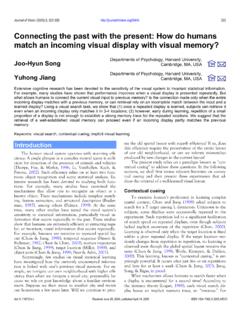Transcription of B. The Challenge of Connecting Past and Present
1 Junior High Class Notes B. The Challenge of Connecting past and Present of the fundamental challenges of seeing how history explains the Present is the complexity of the Present itself. The world we encounter through social media and the 24-hr news cycle seems to be in constant flux. Is it even possible to think of the Present as something stable and knowable? There is a constant pattern to human life (ancient & modern) insofar as it is organized into countries. But if we try to use that as a base for studying history, we find that it is far too complex. C. An Integrated View few countries are important enough to affect the course of history today as individual nations.
2 Those that impart a national impulse to history today are: a)The United States - It is the world s greatest military superpower by far, and also collectively the world s richest and most influential country. No nation has ever played a more disproportionately important role in directing the course of history. b)China - This ancient nation is a distant second, but still a very populous and now economically important country. The Made in China phenomenon is a global reality that could not have been imagined just 40 years ago. c)Russia - This former communist country engages in relatively little international trade, despite its sheer size and resources, but it has an anti-American posture and a large military that gives a distinctive thrust to history.
3 Powell History Page ! 2 The pattern of the world s countries today is too complex to use as a base for learning about history. We need to learn to see the world in terms of its most important historical building blocks. Junior High Class Notes d)Japan - This island nation once tried to create a massive empire, but was stopped by the United States and is now an American ally in Asia and an exceptional prosperous and technologically advanced country. e)India - This very populous nation has a distinctive spectrum of religious practices known collectively as Hinduism. As a country, it seeks to maintain these values even though they have no applicability elsewhere.
4 Countries, like most people, experience history as a tide of human events carrying them along, over which they have little or no control. However, most countries do exert some influence on history by participating in alliances or associations where they can achieve more together than they could apart. We will use the term cultural block to refer to such groupings, of which there are five major ones: a)Germany, France, and Britain used to be among the world s great powers, projecting their national cultures out into the world. Now they affect the world by seeking peaceful coexistence through supranationalism (which suppresses national values) in the form of the European Union.
5 Since there are generally no border controls between these countries and they use the same money (the Euro ) they almost act like a single United States of Europe. b)A large swath of northern Africa, the Middle East, and southern Asia, which includes countries like Egypt, Saudi Arabia, Iran, and Indonesia is also a major cultural block. None of the countries in this block have sufficient military power or a national culture that impacts the world beyond their immediate neighborhood. But the religiosity of this collection of nations which we will refer to as the Islamic World does impact the course of history today. Most followers of the religion of Islam have acquiesced to a cosmopolitan way of life, but a modern reaction against religious toleration and peaceful coexistence with other cultures in the form of Islamism (which notoriously promotes terrorism) means that this block is deeply divided and imparts a violent thrust to history.
6 C)Canada, Australia, and New Zealand (along with a few smaller countries) make up the non-American, non-British Anglosphere. This group of former possessions of the British Empire is not important enough to change the course of history by itself, but its members tend to be allied with the United States, thus contributing to the America-centric system of the world. d)Another group of former European colonies that is now independent is the Iberosphere (or, as it is sometimes known, Ibero-America ). Mexico, Brazil, and Argentina are the main members of this block of nations once controlled by their mother countries, Spain & Portugal (together known as Iberia ).
7 These countries impart little to history other than their continuing desire to maintain a degree of independence from their overbearing neighbor, the United States. e)The final major cultural block in the world is Sub-Saharan Africa. Its nations are poor and still struggling to develop stable governments. They are distinct from northern Africa by the wide acceptance of Christianity and influence of European culture upon them instead of Islam. Powell History Page ! Junior High Class Notes f)Not all the countries of the world fit into a model with ten major blocks. This does not mean they are of no interest. It simply means that they do not affect history on the same scale.
8 They are either entirely within the orbit of some major country or block, or they exhibit strong dependencies upon more than one major country or block. We must always be mindful of the role they might play in affecting how the major blocks act and interact. Powell History Page ! 4 Thinking of the world in terms of historical building blocks gives us a much clearer picture. Some of the cultures that direct the course of history today are countries. Some are collections of countries that affect the world in combinations that can be called cultural blocks.









